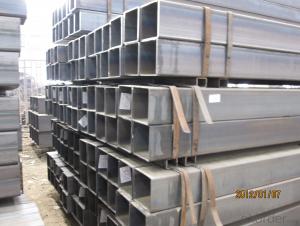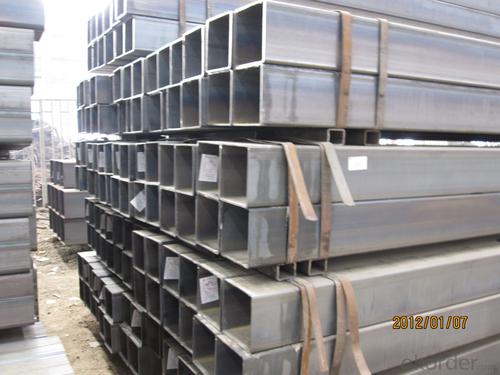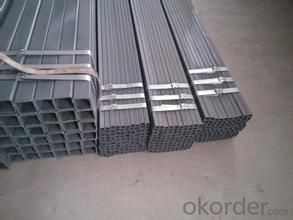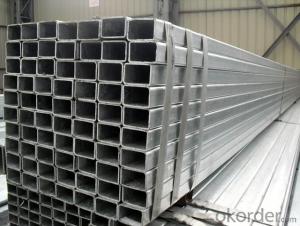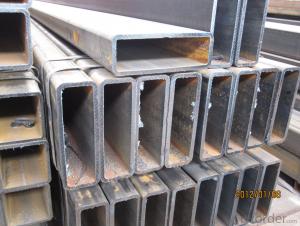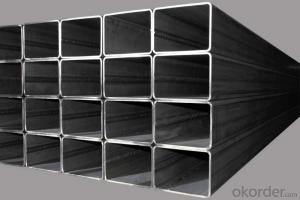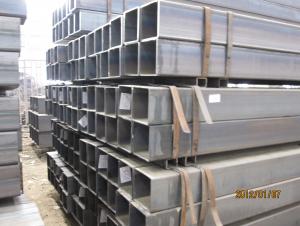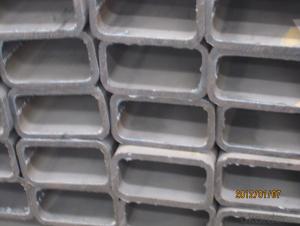Square Hollow Hot Rolled Steel Section
- Loading Port:
- China Main Port
- Payment Terms:
- TT or LC
- Min Order Qty:
- -
- Supply Capability:
- -
OKorder Service Pledge
OKorder Financial Service
You Might Also Like
Quick Details
| Thickness: | 1.0 - 35 mm | Section Shape: | Square | Outer Diameter: | 20*20-600*600 |
| Place of Origin: | Shandong China (Mainland) | Secondary Or Not: | Non-secondary | Application: | Structure Pipe |
| Technique: | Cold Rolled | Certification: | CE | Surface Treatment: | oil,paint |
| Special Pipe: | Thick Wall Pipe | Alloy Or Not: | Non-alloy | Name: | Square Hollow Steel Pipe/Tube |
| Shape: | Square/Rectangular | Yield Strength: | 360-380Mpa | Tensile Strength: | 560-580Mpa |
| Elongation: | 24-28% | Bend Test: | Qualified | Impact Value: | V-notch |
| Grade: | 20#,45#,16Mn,A210,St45,Q235,Q345,Q195,Q215,10#-45#,A53-A369,ST35-ST52,Q195-Q345 | Standard: | JIS G3465-2006,JIS G3466,GB/T 3094 |
Specifications
1.OD:15X15-800X800MM,20X30--600X800MM
2.Thick.:1.0--35.0MM
Square Hollow Section Image
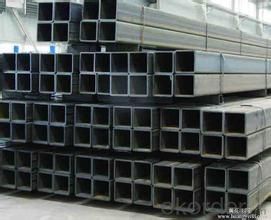
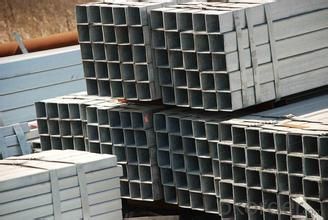
FAQ of Square Hollow Section
①How is the quality of your products?
Our products are manufactured strictly according to national and internaional standard, and we take a test
on every pipe before delivered out. Guaranteed: If products’ quality don’t accord to discription as we give or the promise before you place order, we promise 100% refund.
②How about price?
Yes, we are factory and be able to give you lowest price below market one, and we have a policy that “ for saving time and absolutely honest business attitude, we quote as lowest as possible for any customer, and discount can be given according to quantity”,if you like bargain and factory price is not low enough as you think, just don’t waste your time.Please trust the quotation we would give you, it is professional one.
③Why should you chose us?
Chose happens because of quality, then price, We can give you both.Additionally, we can also offer professional products inquiry, products knowledge train(for agents), smooth goods delivery, exellent customer solution proposals.Our service formula: good quality+good price+good service=customer’s trust
SGS test is available, customer inspection before shipping is welcome, third party inspection is no problem.
Any question, pls feel free to contact us !
- Q: What are the common uses of stainless steel pipes?
- Stainless steel pipes are widely used in various industries for a multitude of applications. Some of the common uses of stainless steel pipes include: 1. Plumbing and Water Supply: Stainless steel pipes are often used in residential, commercial, and industrial plumbing systems due to their corrosion resistance, durability, and ability to handle high-pressure applications. They are also used in water treatment plants and wastewater management systems. 2. Oil and Gas Industry: Stainless steel pipes are extensively used in the oil and gas industry for transporting oil, gas, and other fluids. They can withstand high temperatures, pressure, and corrosive environments, making them ideal for this industry. 3. Food and Beverage Industry: Stainless steel pipes are widely used in the food and beverage industry due to their hygienic properties and resistance to corrosion. They are commonly used for transporting liquids, gases, and food products in processing plants, breweries, wineries, dairies, and other food-related facilities. 4. Chemical and Petrochemical Industry: Stainless steel pipes are critical in the chemical and petrochemical industry, where they are used for transporting corrosive chemicals, acids, and other hazardous substances. The pipes' resistance to corrosion and high temperatures makes them suitable for these demanding applications. 5. Construction and Architecture: Stainless steel pipes are used in construction and architecture for various purposes such as structural support, handrails, guardrails, and decorative elements. Their strength, durability, and aesthetic appeal make them a popular choice in modern architectural designs. 6. Automotive and Transportation: Stainless steel pipes are used in the automotive industry for exhaust systems, fuel lines, and other components that require resistance to high temperatures and corrosion. They are also used in the transportation of fluids and gases in ships, trains, and airplanes. 7. Pharmaceutical Industry: The pharmaceutical industry requires high-quality materials that meet stringent sanitary standards. Stainless steel pipes are commonly used in pharmaceutical manufacturing processes for transporting liquids, gases, and chemicals due to their cleanability, corrosion resistance, and compatibility with pharmaceutical products. 8. Power Generation: Stainless steel pipes are used in power plants, both conventional and renewable, for various applications such as steam lines, condensers, and heat exchangers. They are chosen for their ability to withstand high temperatures, pressure, and corrosive environments. In summary, stainless steel pipes find applications in a wide range of industries including plumbing, oil and gas, food and beverage, chemical and petrochemical, construction, automotive, pharmaceutical, and power generation. Their corrosion resistance, durability, and ability to handle high temperatures and pressure make them a versatile and reliable choice for various industrial applications.
- Q: Which is more load-bearing, the same thickness of steel pipe and steel bar?
- The magnitude of the axial force acting on the steel member is only related to three factors, namely, the strength of the material, the sectional area of A and the longitudinal stability factor of F.
- Q: How are steel pipes used in wastewater treatment?
- Steel pipes are an essential component in the wastewater treatment process. They are used to transport and distribute wastewater from various sources to the treatment facilities. Steel pipes are chosen for this purpose due to their durability, strength, and resistance to corrosion. In wastewater treatment plants, steel pipes are commonly used for multiple applications. Firstly, they are used for the intake of raw wastewater. These pipes are typically large in diameter to accommodate the high flow rate of incoming wastewater. Steel pipes are ideal for this purpose as they can withstand the pressure and turbulence of the wastewater flow. Once inside the treatment facility, steel pipes are used to transport the wastewater to different treatment processes. They connect various units such as screens, grit chambers, sedimentation tanks, and biological reactors. Steel pipes are preferred in these applications due to their ability to handle the corrosive elements present in wastewater, such as chemicals, acids, and gases. Additionally, their durability ensures a long service life, reducing maintenance and replacement costs. Steel pipes are also utilized in the wastewater treatment process for the distribution of treated water. After the wastewater is treated, it undergoes disinfection and other processes to remove harmful contaminants. The treated water is then distributed through steel pipes to be reused for irrigation, industrial processes, or discharged back into water bodies. Furthermore, steel pipes are employed in the construction of wastewater treatment infrastructure. They are used in the installation of underground sewer lines, pumping stations, and manholes. Steel pipes provide the necessary strength and stability to withstand the weight of the soil and other external forces. In summary, steel pipes play a vital role in wastewater treatment by transporting and distributing wastewater, connecting different treatment units, and distributing treated water. Their durability, resistance to corrosion, and ability to handle high-pressure flows make them an ideal choice for this demanding application.
- Q: What are the environmental impacts of steel pipe production?
- The environmental impacts of steel pipe production include the extraction of raw materials (iron ore, coal, and limestone) which leads to habitat destruction and soil erosion. The manufacturing process requires significant energy, contributing to greenhouse gas emissions and air pollution. Additionally, the production generates waste materials, such as slag and by-products, that can contaminate water sources if not properly managed. Finally, the transportation of steel pipes adds to carbon emissions and can disrupt ecosystems if not done sustainably.
- Q: D108*4 what does "D108" mean by seamless steel tubes? What does "*4" mean?
- D108: refers to the outer diameter of 108mm;4: refers to the wall thickness of 4mm.
- Q: How do you calculate the flow rate of water in steel pipes?
- To calculate the flow rate of water in steel pipes, you need to consider the pipe's diameter, length, and the pressure difference across the pipe. Using formulas like the Darcy-Weisbach equation or the Hazen-Williams equation, you can determine the flow rate by plugging in these variables along with the fluid properties.
- Q: The outer circle of a seamless steel pipe 50 head into the outer circle of the 40 to close
- According to the metal processing performance, pipe size, quality requirements, as well as investment and benefits to choose different processing methods and corresponding auxiliary processes. The basic process of cold rolling of cold drawn pipe are: (1) tube feeding, the pipe material for hot-rolled finished or semi-finished tube, pipe extrusion pipe and welded pipe; (2) pipe material preparation, including inspection, bundling, pickling, cleaning, washing, drying, neutralization, grease and so on; (3) cold processing (cold or cold); (4) finished finishing finished including heat treatment, straightening, sampling, end cutting, inspection (manual inspection and various testing), pressure test, oiling, packaging and warehousing etc.. Different products are refined and the content varies.
- Q: Can steel pipes be used for conveying oil?
- Yes, steel pipes are commonly used for conveying oil due to their durability, strength, and resistance to corrosion. They are able to withstand high pressure and temperature conditions, making them ideal for transporting oil over long distances.
- Q: What are the different methods of joining steel pipes without welding?
- There are multiple ways to connect steel pipes without welding. These include: 1. Mechanical Couplings: These couplings consist of two separate pieces that attach to the pipe ends and then tighten together. They provide a secure and leak-proof connection, eliminating the need for welding. 2. Threaded Connections: This method involves threading the ends of the steel pipes to create a male and female connection. The pipes are then screwed together using pipe threads, creating a strong and dependable joint. 3. Flanged Connections: Flanges are utilized to connect steel pipes by bolting them together. The flanges have a flat surface with holes that align with corresponding holes in the opposing flange. Bolts are inserted and tightened to establish a tight seal. 4. Grooved Connections: This technique involves grooving the pipe ends and using grooved couplings to join them. The couplings have teeth that interlock with the grooves, resulting in a secure and rigid connection. 5. Compression Fittings: Compression fittings are employed to connect steel pipes by compressing a metal or plastic ring onto the outer surface of the pipe. This creates a tight seal and a reliable connection without welding. 6. Adhesive Bonding: Special adhesives designed for bonding metals can be used to connect steel pipes. The adhesive is applied to the pipe surfaces, which are then pressed together and left to cure, forming a strong and durable bond. 7. Clamping: Clamps can be used to hold steel pipes together, creating a temporary connection. This method is commonly used for testing purposes or in situations where the pipes need to be easily dismantled. Each of these methods has its own benefits and limitations, and the choice depends on various factors such as the specific application, pipe material, and required joint strength.
- Q: Are steel pipes suitable for use in nuclear power plants?
- Yes, steel pipes are suitable for use in nuclear power plants. They are commonly used for various purposes including cooling systems, steam generation, and containment of radioactive materials due to their high strength, durability, and resistance to corrosion.
Send your message to us
Square Hollow Hot Rolled Steel Section
- Loading Port:
- China Main Port
- Payment Terms:
- TT or LC
- Min Order Qty:
- -
- Supply Capability:
- -
OKorder Service Pledge
OKorder Financial Service
Similar products
Hot products
Hot Searches
Related keywords
